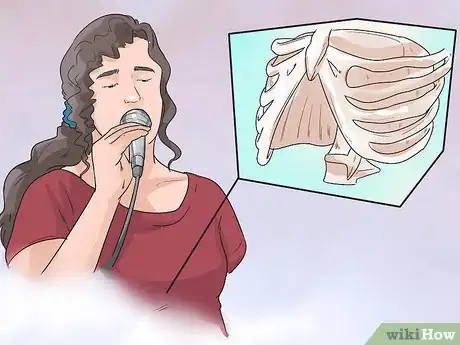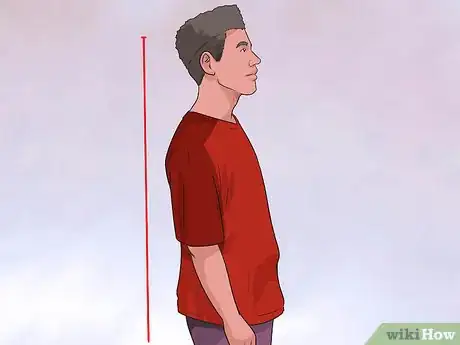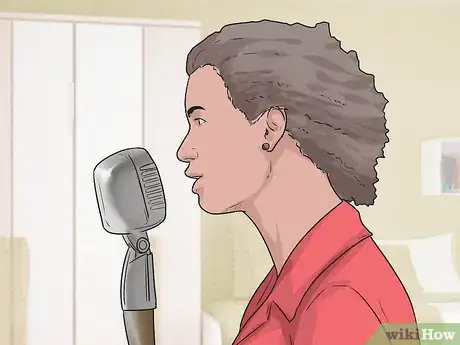This article was co-authored by Amy Chapman, MA and by wikiHow staff writer, Jessica Gibson. Amy Chapman MA, CCC-SLP is a vocal therapist and singing voice specialist. Amy is a licensed and board certified speech & language pathologist who has dedicated her career to helping professionals improve and optimize their voice. Amy has lectured on voice optimization, speech, vocal health, and voice rehabilitation at universities across California, including UCLA, USC, Chapman University, Cal Poly Pomona, CSUF, CSULA. Amy is trained in Lee Silverman Voice Therapy, Estill, LMRVT, and is a part of the American Speech and Hearing Association.
There are 13 references cited in this article, which can be found at the bottom of the page.
This article has been viewed 145,942 times.
Struggling to belt out your favorite songs and project your voice? While some people seem to be natural vocal powerhouses, it's totally normal to get nervous or struggle with volume when it comes to singing. To sing loudly and comfortably without hurting your voice, you'll need to understand how you produce sound and build your singing stamina. We'll walk you through key vocal techniques to sing louder in a way that's comfortable and safe for your voice.
Steps
Learning Proper Singing Techniques
-
1Use your diaphragm to sing louder. When you sing, the power should come from deep in your breath, rather than your throat. The diaphragm, a muscle attached to your lungs, helps your lungs expand so you can take deep breaths and control your voice. Check to see if you're taking full breaths by looking at yourself in the mirror. You shouldn't see your shoulders move as you breathe. Instead, you should simply feel like you're pushing down as you breathe.
- If you’re having trouble regulating your breath, lay down on the ground and place a book on your stomach. Practice moving this book up and down by taking full deep breaths. This is how you should breathe when you sing.
-
2Loosen tension in your jaw and neck. If you keep your neck and jaw clenched, your musical tone will be unbalanced and it can strain or damage your voice over time. As you begin to sing louder in a song, especially on higher notes, it’s natural for your jaw to hold some tension. This is because your chin will naturally start to drift upward. Make an effort to point it down at the ground. This will help loosen jaw tension. Try to keep your jaw hanging loosely.[1] [2]
- Avoid opening your jaw as wide as it will go or it can actually close off your throat, which won't help you sing louder.
Advertisement -
3Use good body posture. Stand up straight so your shoulders aren't hunched forward. Try to keep your head facing straight. Relax your hands and avoid locking your knees. If you have to sit down while you sing, keep your back straight against the chair and keep your shoulders pulled back. Your abdomen should be flat and firm, not slumped forward.[3] [4]
- Proper posture will help your breathing, which can improve vocal tone and projection.
-
4Use forward placement when you sing. Placement is a singing technique in which you make resonating sounds or vibrations to get a full loud sound. To do forward placement (or "the mask"), you should feel the volume of your voice in front of your face, behind your mouth, on your cheeks, and possibly along your forehead. Pull your voice up through the soft palate and out through the front of your face.[5]
- You may feel a slight vibration in your nose, but don't worry. When done correctly, using forward placement will give you a deep sound that isn't nasally.
-
5Perform breathing exercises. Being able to breathe deeply will strengthen the muscles you need for singing and increase your lung capacity, making it easier to sing louder.[6] Practice breathing exercises every day. While breathing exercises are important, it's also critical to have good posture and do forward placement. For a good simple breathing exercise:[7]
- Lay on your back with your hands on your waist. Take a full breath and focus on expanding your stomach from bottom to top. This should make your hands raise up and out if you do it correctly. Once your breath is comfortably full, breathe out slowly to a count of 5. Repeat this exercise 10 times.
- Breathing exercises are also a great way to calm your nerves before a performance.[8]
-
6Do vocal exercises. You should always warm up the muscles you'll need to sing, especially if you're trying to sing louder. Vocal exercises can prevent damage to your muscles while building your vocal strength.[9] Practice lip trills by blowing air through your closed but relaxed lips. You should sing an "uh" vowel sound. You'll feel your your lips trill, if done correctly.[10]
- For a simpler exercise, make the 'ng" sound (like at the end of the word "lung"). Keep making the sound to practice moving your tongue against your soft palate.
Singing Louder When You’re Nervous
-
1Practice your songs. When you’re performing and nervous, it’s natural to get a bit quieter. Before you perform, practice your songs until you can sing them without even thinking about it. Knowing you're prepared can give you the confidence you need to sing loudly and clearly. It may even calm your nerves.[11]
- Be sure to select songs that work with your vocal range. If you're unsure whether a song will work with your range, ask your vocal coach for feedback.
-
2Relax your breathing. While breathing exercises will strengthen your muscles and open up your lungs for full breaths, avoid taking deep breaths and holding them. When you're nervous about singing, just try to breathe normally. Stay relaxed so you're not creating tension.[12]
- Practice your breathing before you begin singing. Do something simple like count your breaths in and out. For example, breathe in for five counts and release for five counts. Continue doing this until you're calm and ready to sing.
-
3Focus on your passion. Remind yourself why you want to sing. Chances are, if you keep your mind on your love for singing, you'll overcome your anxiety and be able to sing loudly and clearly. To help you focus, consider closing your eyes and paying attention to the words of the sing. Really let your emotions come through the music and worry less about your fears.[13]
- If you close your eyes, remember not to tilt your chin upward, which can make it harder to sing loudly.
-
4Work with a vocal teacher. One of the most helpful things you can do to sing louder, is to find a vocal teacher. A voice coach can give you valuable feedback on your singing technique. It will also be useful to have someone to tell you if you are, in fact, singing louder than before. Listen to your teacher's suggestions for improvement and remember that your teacher is there to help you become a better singer.[14]
- Find a vocal teacher who specializes in a genre of singing that you want to do.
Singing with Amplification
-
1Sing right into the middle of the microphone. Singing directly into the center of the microphone will pick up the best range of sound in your voice. You should still project your voice to the back of the room, but don't be afraid to sing into the microphone.[15]
- Practice using the microphone and ask a friend or vocal coach to tell you how loud you are. Try singing directly into the microphone and compare it to singing into the side of the microphone. Ask for feedback about your volume.
-
2Sing with your lips almost touching the microphone. You'll need to be very close to the microphone for it to pick up your voice. You lips should almost touch the microphone if you're singing softly and if you sing loudly, your lips should be a few centimeters from the mic.[16]
- If you stand too far back from the microphone, the mic probably won't be able to pick up your voice.
-
3Soften your "P" or "B" sounds. If you're singing close to the microphone, some words can make a loud popping noise. Move your mouth slightly to the side of the microphone when singing words that start with "P" or "B." After the word, direct your face back to the center of the microphone.[17]
- You only need to move a little to the side of the microphone. Don't worry if you still get occasional pops while singing. This is to be expected with using a microphone.
-
4Adjust your singing to fit the song. Plan on how you'll use your microphone for each song. Sing through the song, moving closer during slower or quieter parts and back away from the microphone during parts of the song that require you to speed up, sing louder, or sing at a higher pitch.[18]
- Use the microphone to your advantage. It can easily amplify your voice during softer parts of a song and you can back away a few inches when you need your sound to really pop.
Community Q&A
-
QuestionWhat do I do if I don't have a microphone?
 Community AnswerSing from your diaphragm, and keep your mouth wide open - like you're smiling. Try to push your diaphragm a little bit more than usually - but don't overdo it, because that can sound odd.
Community AnswerSing from your diaphragm, and keep your mouth wide open - like you're smiling. Try to push your diaphragm a little bit more than usually - but don't overdo it, because that can sound odd. -
QuestionHow do I sing loud and clear without making any mistakes?
 Community AnswerPractice with a voice coach who specializes in your area of singing. Find a professional singer that teaches as a side job, as they will know good tips for a voice student.
Community AnswerPractice with a voice coach who specializes in your area of singing. Find a professional singer that teaches as a side job, as they will know good tips for a voice student. -
QuestionDoes vocal Fach affect how long and how powerfully you can hold notes?
 Community AnswerYes, it does affect your singing and vocals in particular, but with practice, you can easily overcome that.
Community AnswerYes, it does affect your singing and vocals in particular, but with practice, you can easily overcome that.
References
- ↑ http://caricole.com/5-secrets-to-make-your-voice-sound-better/
- ↑ http://www.singwise.com/cgi-bin/main.pl?section=articles&doc=VocalTractShaping&page=2
- ↑ http://www.singwise.com/cgi-bin/main.pl?section=articles&doc=VocalTractShaping&page=2
- ↑ http://cmed.faculty.ku.edu/gummposture/posture.html
- ↑ http://voicestudio.kristinaseleshanko.com/SingingTerms.htm
- ↑ Amy Chapman, MA. Singing Coach. Expert Interview. 18 October 2019.
- ↑ http://www.vocalist.org.uk/breathing_exercises.html
- ↑ Amy Chapman, MA. Singing Coach. Expert Interview. 18 October 2019.
- ↑ Amy Chapman, MA. Singing Coach. Expert Interview. 18 October 2019.
- ↑ http://www.backstage.com/advice-for-actors/singing/top-10-exercises-for-your-vocal-health/
- ↑ http://takelessons.com/blog/how-to-improve-your-singing
- ↑ https://www.theguardian.com/lifeandstyle/2014/jun/19/how-went-from-rubbish-singer-karaoke-star
- ↑ http://www.anxietycoach.com/performanceanxiety.html
- ↑ http://www.nats.org/cgi/page.cgi/find_teacher.html
- ↑ http://www.musicademy.com/2011/05/good-microphone-technique-can-make-a-difference/
- ↑ http://www.become-a-singing-master.com/learning-to-sing.html
- ↑ http://www.become-a-singing-master.com/learning-to-sing.html
- ↑ http://www.musicademy.com/2011/05/good-microphone-technique-can-make-a-difference/
About This Article
If you want to sing louder, stand up straight with your shoulders back, since good posture will improve your breathing and voice projection. Additionally, try to breathe using your diaphragm to expand your lungs, which will give you more volume. Alternatively, if you struggle to sing loudly due to nerves, try focusing solely on your passion for singing, like by closing your eyes as you sing so outside distractions don't affect you. For tips on how to work with a vocal coach or how to sing louder through a microphone, read on!











































































